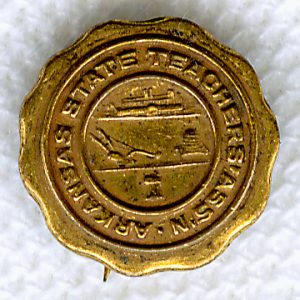calsfoundation@cals.org
Arkansas Education Association
The Arkansas Education Association (AEA) is a group of teachers, administrators, and support staff who promote public education and the teaching profession. The association closely monitors the state legislature, the state Department of Education, and school boards, and it lobbies for policies decided on in its Representative Assembly.
The association was organized on July 2, 1869, in Little Rock (Pulaski County) as the State Teachers Association. Thomas Smith, the first state superintendent of public instruction, founded the group and was its first president. Twenty-two people signed on as charter members. Smith wrote that the group’s purpose was “promoting the cause of popular education in the state and uniting the teachers and superintendents in closer and more intimate fraternal relations in the prosecution of their high and holy calling.” Free public schools had been started only a year earlier, in 1868. Arkansas teachers were unorganized and some had little education and little contact with each other. The AEA was created to fix some of these problems.
The group was a driving force in the formation of Arkansas’s public education system after the Civil War. In its early years, the organization focused on school finances and asked Arkansas representatives in Congress to grant land to the state for schools.
The young state public school system was on the verge of financial collapse, and sentiment across the state was against public schools in 1874 as the legislature opened a convention to write the state constitution. R. H. Parham, a Democratic legislator and an AEA member from St. John’s College in Little Rock, wrote a school law for the legislature providing for unpaid local school boards elected by the people, county examiners appointed by the county judge, and a state superintendent of education, to be elected; public education thus became a component of the new state constitution.
Throughout the early 1900s, Arkansas had lower teacher salaries and per-pupil spending and shorter school terms than its neighbors. In 1909, the legislature acted on two of the association’s main priorities by passing a compulsory-education law and establishing a legal basis for consolidating rural districts. By 1910, teacher salaries had risen to $56 a month from an average of $32 a month in 1900. The association was also active in promoting uniform curriculum for schools.
The Arkansas State Teachers Association became the Arkansas Educational Association in 1920 and the Arkansas Education Association in 1924. The organization bought the privately published Arkansas Teacher magazine and renamed it the Journal of Arkansas Education, with the first issue in January 1923; the magazine ceased publication in 1975.
Throughout the racial integration of schools in the 1950s and 1960s, the association worked to preserve the public school system. It had no official position on integration but wanted public schools to remain under the law.
The group merged in 1969 with the Arkansas Teachers Association, an organization of African American educators throughout the state. In 1974, the AEA unified with the National Education Association (NEA). Now, a person cannot join the AEA alone but must join the NEA at the same time. Membership dues are paid to the AEA, but the NEA is sent a portion. The AEA supports NEA goals and objectives, and the NEA sends national money to Arkansas for political candidates who support education issues when the AEA does not have enough money to fund them.
The AEA strives to keep its members updated on education bills in the legislature. The scope has expanded to include teacher insurance and benefits, planning time, scholarships, and professional development. The AEA website includes legislative updates, along with AEA position statements and a bill tracker. The association does not release membership numbers, but at one time it printed 18,000 copies of its newsletter.
For additional information:
Arkansas Education Association. http://www.aeaonline.org/ (accessed April 30, 2025).
Stinnett, T. M., and Clara B. Kennan. All This and Tomorrow Too: A History of the Arkansas Education Association. Little Rock: Arkansas Education Association, 1969.
Denise Malan
Fayetteville, Arkansas


 AEA Building
AEA Building  ASTA Lapel Pin
ASTA Lapel Pin 



Comments
No comments on this entry yet.